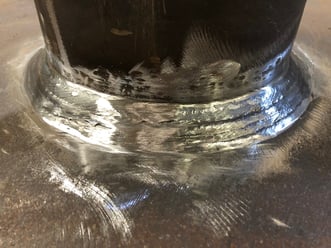Share this
What type of welding is the best for my application?
by Therser UK on 02-May-2023 14:22:19
There is no one "best" type of welding as each type has its own advantages and disadvantages depending on the application and materials being welded. Some factors to consider when selecting a welding method include the type and thickness of the material, the desired strength and quality of the weld, the cost and availability of equipment and materials, and the skill level and experience of the welder.
Here are some common types of welding and their strengths:
-
MIG welding (Metal Inert Gas): MIG welding is easy to learn, versatile, and can be used on a wide range of metals, including aluminum and stainless steel. It produces high-quality welds with good penetration and minimal spatter, making it a popular choice for both DIY and professional welding projects.
-
TIG welding (Tungsten Inert Gas): TIG welding produces extremely high-quality welds with precise control over the heat input and weld puddle. It can be used on a wide range of materials and thicknesses and is often used for precision welding of delicate or complex parts.

-
Stick welding (Shielded Metal Arc Welding): Stick welding is a versatile and inexpensive welding method that can be used on a wide range of materials and in outdoor or windy conditions. It is often used in construction, maintenance, and repair projects.
-
Flux-cored welding: Flux-cored welding uses a continuously fed wire electrode that contains a flux core, eliminating the need for a separate shielding gas. It is often used for welding thick or dirty materials and is a popular choice for outdoor and field welding applications.
-
Gas welding: Gas welding uses a flame to heat and melt the metal, which is then joined using a filler rod. It is a versatile welding method that can be used on a wide range of materials, but it requires a high degree of skill and experience to produce high-quality welds.
In summary, the best type of welding method depends on the specific needs of the project, including the material being welded, the required strength and quality of the weld, and the experience and skill level of the welder. It's important to consult with a qualified welding professional to determine the best method for your specific application.
Please contact our sales team today on 44 (0)1782 824453 or drop us an email to sales@therseruk.com
Share this
- Company News (90)
- Battery Materials (41)
- kiln (37)
- fabrication (29)
- Alloy (27)
- Furnace (27)
- Welding (16)
- Industrial Kilns (15)
- Battery (13)
- Ceramic Kilns (13)
- Processes (13)
- alloy fabrication (13)
- Shuttle Kilns (12)
- RTO’s (11)
- Vacancies (11)
- Hydrogen (10)
- Therser UK (9)
- Tunnel Kiln (9)
- Refractory (8)
- Therser (8)
- Wellman Furnaces (8)
- Brickwork (7)
- Case Studies (7)
- Afterburners (6)
- Fibre Lining (6)
- electric (6)
- Almor Wellman (5)
- thermal engineers (5)
- Biochar (4)
- Exhibition (4)
- Pyrolysis (4)
- Servicing (4)
- Spares (4)
- heat treatment (4)
- History (3)
- Ceramics Uk (2)
- Combustion Control Upgrades (2)
- Nitrogen (2)
- Temperature Control Rings (2)
- gas (2)
- Certificates (1)
- Instrumentation (1)
- MMC (1)
- RHK (1)
- Roller Hearth Kiln (1)
- Test Trials (1)
- aerospace (1)
- analyser (1)
- elec (1)
- oxygen (1)
- vans (1)
- September 2025 (2)
- May 2025 (2)
- March 2025 (1)
- February 2025 (2)
- January 2025 (5)
- December 2024 (5)
- November 2024 (7)
- October 2024 (5)
- September 2024 (4)
- August 2024 (14)
- July 2024 (13)
- June 2024 (2)
- May 2024 (5)
- April 2024 (13)
- March 2024 (8)
- February 2024 (12)
- January 2024 (14)
- December 2023 (6)
- November 2023 (12)
- October 2023 (24)
- September 2023 (11)
- August 2023 (11)
- July 2023 (9)
- June 2023 (15)
- May 2023 (53)
- April 2023 (5)
- March 2023 (6)
- February 2023 (7)
- January 2023 (3)
- December 2022 (8)
- November 2022 (5)
- October 2022 (11)
- September 2022 (1)
- August 2022 (2)
- July 2022 (1)
- June 2022 (2)
- May 2022 (1)
- March 2022 (1)
- February 2022 (1)
- January 2022 (1)
- December 2021 (3)
- October 2021 (1)
- August 2021 (1)
- June 2021 (1)
- May 2021 (4)
- April 2021 (2)
- March 2021 (4)
- February 2021 (2)
- December 2020 (3)
- November 2020 (1)
- September 2020 (3)
- May 2020 (1)
- April 2020 (2)
- March 2020 (1)
- January 2020 (1)
- December 2019 (1)
- July 2019 (2)
- June 2019 (1)
- April 2019 (2)
- March 2019 (3)
- February 2019 (4)
- December 2018 (1)
- November 2018 (1)
- September 2018 (2)
- August 2018 (1)
- July 2018 (1)
- May 2018 (3)
- April 2018 (1)
- February 2018 (3)
- January 2018 (2)
- December 2017 (3)
- November 2017 (1)
- October 2017 (2)
- September 2017 (4)
- August 2017 (1)
- July 2017 (2)
- June 2017 (2)
- May 2017 (3)
- April 2017 (3)

